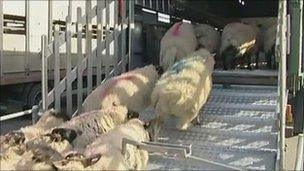Port of Ramsgate live animal exports protest meeting
- Published

The NFU said the shipments were "inter-community trade"
A public meeting is to be held by campaigners opposed to the shipments of live animals through the Port of Ramsgate.
In May Thanet District Council, which owns the port, said an unnamed company was due to start exporting to Europe but it had no power to stop the trade.
Councillor Ian Driver said the meeting was being held on Friday to decide what action could be taken.
The National Farmers' Union (NFU) said animals were well treated.
Thanet District Council said it objected on "moral grounds" to live export, but because Ramsgate was an "open port" it had no powers to ban the trade.
Britain started exporting live calves to the continent for veal and beef again in 2006, after the lifting of a decade-long EU ban imposed to prevent the spread of BSE.
'Cruel and barbaric'
Live exports currently take place at the Port of Dover where animal rights protesters have held regular demonstrations.
Mr Driver said: "I am not an animal rights activist, I'm not even a vegetarian, but I am sickened by what is going on at the Ramsgate port and can't stand back and let it happen.
"Live animal exports are widely recognised as being cruel and barbaric but I have been told by council officers that the port is legally powerless to stop this disgusting trade.
"If the law can't be used to protect the animals from this cruelty, then anyone with a conscience should be protesting to change the rules and stop this horrific trade happening on our doorstep."
Frank Langrish, a member of the livestock board of the NFU, told BBC Radio Kent: "Going back in the 90s there were hundreds of thousands of animals shipped across [the Channel], mostly through Dover, and it was the focus of a good deal of attention.
"The vehicles have changed, the conditions that the animals are transported in have changed, the distances involved and the controls on these animals have all changed. Now it's a very regulated business.
"Within the UK animals that come down from the Highlands and Islands of Scotland are actually on ferries for over 12 hours.
"We're only talking about, if we can go on a P&O freight ferry, an hour and a half across the Channel."
He added: "A farmer has to make an income. There is an enormous difference in the value of a calf 22 miles away because it has the possibility of being turned into a veal animal.
"The higher the value the animal has the higher the welfare will always be.
"You do not treat badly an animal because it won't thrive for you or may get disease so you have to ensure that it arrives at its destination in perfect condition, otherwise you won't get paid for it."